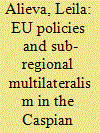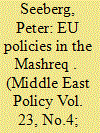| Srl | Item |
| 1 |
ID:
091408


|
|
|
|
|
| Publication |
2009.
|
| Summary/Abstract |
The EU's agenda in promoting multilateralism faces a few challenges in the eastward direction. The Caspian Sea basin, which has been acquiring increasing importance for the EU in the context of energy, above all gas, supplies from the Caucasus and Central Asia, represents a complex mix of states with different histories, identities, regimes, centres of gravity and regional ambitions. Unlike the Black Sea basin, where the EU has developed the Black Sea Synergy policy, none of the Caspian littoral states is an EU member and this has led to a lack of EU interest in and commitment to the promotion of multilateralism in the area. Thus, in spite of significant energy security interests, the EU lacks the will, the capacity or the consistency to address regional security issues or promote reform. Indeed, economic interests are inevitably likely to clash with the reform promotion objective.
|
|
|
|
|
|
|
|
|
|
|
|
|
|
|
|
| 2 |
ID:
149122


|
|
|
|
|
| Summary/Abstract |
The launching of the review of the European Neighborhood Policy (ENP) took place only a few days after the terror attacks in Paris on November 13, 2015. In her press release, the EU High Representative Federica Mogherini added that “the new ENP will take stabilization as its main political priority.”2 Furthermore, it was said that “differentiation and greater mutual ownership will be the hallmark of the new ENP.”3 This article discusses to what degree the EU's foreign and security policies towards the regimes in the Mashreq are capable of contributing to the stabilization of this highly differentiated Middle Eastern subregion. The article analyzes how important foreign- and security-policy dimensions emphasized in the ENP review are dealt with in the context of the Arab regimes in the Mashreq: Egypt, Jordan, Lebanon, Palestine and Syria.
|
|
|
|
|
|
|
|
|
|
|
|
|
|
|
|